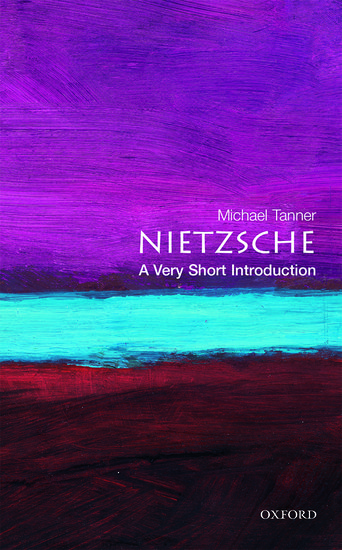Home >
A Very Short Introduction >
Nietzsche (Philosophy)
A Very Short Introduction | Philosophy
Nietzsche
ISBN: 9780192854148
Series: A Very Short Introduction
Nietzsche (Philosophy)
A Very Short Introduction Nietzsche (Philosophy) Media > Books > Non-Fiction > Education Books Expect Delays of Up to 4 Weeks| Order Below |
ISBN
9780192854148 (10-digit ISBN: 0192854143)
- Description
- Key Features
- Series Description
- Table of Contents
- The clearest introduction to Nietzsche available
- Nietzsche is a perennially fascinating, misinterpreted figure, studied on the majority of philosophy courses.
- Tanner's writing is immensely readable and he doesn't fall into the trap of taking a certain moral line or of being patronizing
- Examines the ambiguities inherent in Nietzsches writings, and the many misconceptions about him
The philosophy of Friedrich Nietzsche (1844-1900) was almost wholly neglected during his sane life, which came to an abrupt end in 1889. Since then he has been appropriated as an icon by an astonishingly diverse spectrum of people, whose interpretations of his thought range from the highly irrational to the firmly analytical. Thus Spoke Zarathustraintroduced the 'superman' and The Twilight of the Idols developed the 'Will to Power' concept; these term, together with 'Sklavenmoral' and 'Herrenmoral', became confused with the rise of nationalism in Germany. Idiosyncratic and aphoristic, Nietzsche is always bracing and provocative, and temptingly easy to dip into. Michael Tanner's readable introduction to the philosopher's life and work examines the numerous ambiguities inherent in his writings. It also explodes the many misconceptions fostered in the hundred years since Nietzsche wrote, prophetically: 'Do not, above all, confound me with what I am not!'
Oxford's Very Short Introductions series offers concise and original introductions to a wide range of subjects--from Islam to Sociology, Politics to Classics, Literary Theory to History, and Archaeology to the Bible.
Not simply a textbook of definitions, each volume in this series provides trenchant and provocative--yet always balanced and complete--discussions of the central issues in a given discipline or field. Every Very Short Introduction gives a readable evolution of the subject in question, demonstrating how the subject has developed and how it has influenced society. Eventually, the series will encompass every major academic discipline, offering all students an accessible and abundant reference library.
Whatever the area of study that one deems important or appealing, whatever the topic that fascinates the general reader, the Very Short Introductions series has a handy and affordable guide that will likely prove indispensable.
Please note: As this series is not ELT material, these titles are not subject to discount.
Dedication
Abbreviations
1. The Image of Nietzsche
2. Tragedy: Birth, Death, Rebirth
3. Disillusionment and Withdrawal
4. Morality and its Discontents
5. The One Thing Needful
6. Prophecy
7. Occupying the High Ground
8. Masters and Slaves
9. Philosophizing with a Hammer
Postlude: Nietzsche and Life Insurance
References
Further Reading
A Note on Translations
Index
The philosophy of Friedrich Nietzsche (1844-1900) was almost wholly neglected during his sane life, which came to an abrupt end in 1889. Since then he has been appropriated as an icon by an astonishingly diverse spectrum of people, whose interpretations of his thought range from the highly irrational to the firmly analytical. Thus Spoke Zarathustraintroduced the 'superman' and The Twilight of the Idols developed the 'Will to Power' concept; these term, together with 'Sklavenmoral' and 'Herrenmoral', became confused with the rise of nationalism in Germany. Idiosyncratic and aphoristic, Nietzsche is always bracing and provocative, and temptingly easy to dip into. Michael Tanner's readable introduction to the philosopher's life and work examines the numerous ambiguities inherent in his writings. It also explodes the many misconceptions fostered in the hundred years since Nietzsche wrote, prophetically: 'Do not, above all, confound me with what I am not!'
Key Features
- The clearest introduction to Nietzsche available
- Nietzsche is a perennially fascinating, misinterpreted figure, studied on the majority of philosophy courses.
- Tanner's writing is immensely readable and he doesn't fall into the trap of taking a certain moral line or of being patronizing
- Examines the ambiguities inherent in Nietzsches writings, and the many misconceptions about him
Series Description
Oxford's Very Short Introductions series offers concise and original introductions to a wide range of subjects--from Islam to Sociology, Politics to Classics, Literary Theory to History, and Archaeology to the Bible.
Not simply a textbook of definitions, each volume in this series provides trenchant and provocative--yet always balanced and complete--discussions of the central issues in a given discipline or field. Every Very Short Introduction gives a readable evolution of the subject in question, demonstrating how the subject has developed and how it has influenced society. Eventually, the series will encompass every major academic discipline, offering all students an accessible and abundant reference library.
Whatever the area of study that one deems important or appealing, whatever the topic that fascinates the general reader, the Very Short Introductions series has a handy and affordable guide that will likely prove indispensable.
Please note: As this series is not ELT material, these titles are not subject to discount.
EASY ORDER FORM
PRICES LISTED INCLUDE CONSUMPTION TAX
Price Before Tax:
¥1,790


